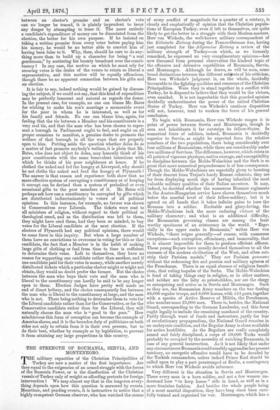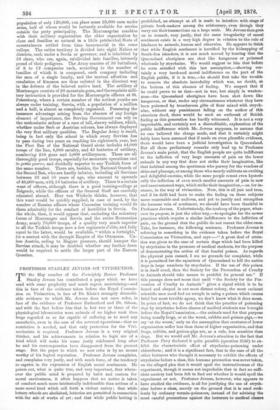THE STRENGTH OF ROUMANIA, SERVIA, AND MONTENEGRO.
THEmilitary capacities of the Christian Principalities of Turkey are now a matter of the first importance. Are they equal to the exigencies of an armed struggle with the forces of the Suzerain Power, or is the disaffection of the Christian vassals of Turkey only of weight as affording pretexts for foreign intervention ? We may almost say that in the long-run every- thing depends upon how this question is answered by events. Meantime, and pending events, it is instructive to notice that a highly competent German observer, who has watched the course of every conflict of magnitude for a quarter of a century, is clearly and emphatically of opinion that the Christian popula- tions of European Turkey, even if left to themselves, are quite likely to get the better in a struggle with their Moslem masters. Herr von Wickede, the well-known military correspondent of the Kolnisehe Zeitung during the Franco-German war, having just completed for the Allgenzeine Zeitung a review of the military strength of Turkey—on which, as we formerly remarked, he expressed no very complimentary opinions—has now discussed from personal observation the kindred topic of the offensive and defensive capabilities of Roumania, Servia, and Montenegro. Although he draws, as will be seen, some broad distinctions between the different subjects of his criticism, Herr von Wickede's judgment is, on the whole, decidedly favourable to the fighting qualities and resources of the Christian Principalities. Were they to stand together in a conflict with Turkey, he is disposed to believe that they would be the victors, even unaided. It is not improbable that this guarded opinion decidedly underestimates the power of the united Christian States of Turkey. Herr von Wickede's cautious disposition will not, however, tend to weaken the force of his general conclusion.
To begin with Roumania, Herr von Wickede ranges it in point of power between Servia and Montenegro, though in area and inhabitants it far outstrips its fellow-States. In numerical force of soldiers, indeed, Roumania is decidedly superior to Servia, as might be expected from the relative numbers of the two populations, there being considerably over four millions of Roumanians, while there are considerably under two millions of Servians. The difference, however, which exists in all points of vigorous physique, native courage, and susceptibility to discipline between the Moldo-Walachian and the Serb is so great that mere numerical preponderance is of less consequence. Though the Moldo-Walachians are especially given to boasting of their descent from Trajan's hardy Roman colonists, they are far from displaying much sign of having inherited the most valuable military qualities of their Italian ancestors. It may, indeed, be doubted whether the numerous Rouman regiments in the Austro-Hungarian service have shown themselves much below the martial level of their fellow-soldiery, but it is agreed on all hands that it takes infinite pains to turn the Rouman into a soldier. Excitable and glory-loving, the Moldo-Walachians lack the more enduring virtues of the military character ; and what is an additional difficulty, the Roumanian governing classes are among the least worthy specimens of an aristocracy in the world. "Espe- cially in the upper ranks in Roumania," writes Herr von Wickede, "there reigns generally—of course, with numerous exceptions—such corruption, effeminacy, and immorality, that it is almost impossible for them to produce efficient officers. These young Boyars have usually devoted themselves to all the excesses of the modern civilisation of the West, and often out- strip their Parisian models." They are Parisian gomnzeux without the redeeming fire and passion and military aptness of the Frenchman. There is an equal absence of religions fanati- cism, that ruling impulse of the Serbs. The Moldo-Walachian is fond of taking things easy in religion as in other matters, and neither are the laity so priest-ridden nor are the clergy so enterprising and active as in Servia and fliontenegro. Such as they are, the Roumanian Army numbers on the war footing 48,000 regular troops, and 8,000 horses' with 124 guns, together with a species of Active Reserve of Militia, the Dorobanzes, who number some 23,000 men. There is, besides, the National Guard, corresponding to the German Landwehr' and this force ought legally to include the remaining manhood of the country. Partly through want of funds and instructors, partly for fear of revolutionary propagandism, the National Guard remains in an embryonic condition, and the Regular Army is alone available for active hostilities. As the Regulars are really completely aimed and fairly disciplined, a corps of 50,000 Turks would probably be occupied by the necessity of watching Roumania, in case of any general insurrection. As it is not likely that under any circumstances Roumania could sensibly aggrandise her present territory, no energetic offensive would have to be dreaded by the Turkish commanders, unless indeed Prince Karl should be called upon to play a part prearranged at Berlin, a contingency to which Herr von Wickede avoids reference.
Very different is the situation in Servia and Montenegro. There every man is a born soldier, and not a few women un- derstand how "to keep house" rifle in hand, as well as in a more feminine fashion. And besides the whole people being of a most martial disposition, they have long since been care- fully trained and organised for war. Montenegro, which has a population of only 120,000, can place some 23,000 men under arms, half of whom would be instantly available for service outside the petty principality. The Montenegrins combine with their military organisation the older organisation by clans and families so natural in a little patriarchal State of mountaineers settled from time immemorial in the same valleys. The entire territory is divided into eight Nahies or districts, each under a Serda or governor, and is inhabited by 38 clans, who are, again, subdivided into families, intensely proud of their pedigrees. The Army consists of 30 battalions, of 8 to 12 companies each, according to the number of families of which it is composed, each company including the men of a single family, and the mutual affection and emulation of kinsmen are thus enlisted in the directest way in the defence of the beloved native land. The artillery of Montenegro consists of 28 mountain guns, and the requisite mili- tary instruction is provided for the Montenegrin officers at St. Petersburg, where a certain number of the noblest youths are always under training. Servia, with a population of dmillion and a half, is almost as completely organised. Possessing the immense advantage arising from the absence of any foreign element of importance, the Servian Government can rely on the enthusiastic ardour of a race of tall, sinewy soldiers, which, whether under Serb or Austrian colours, has always displayed the very first military qualities. The Regular Army is small, being in fact only the school in which every Servian has to pass during two years on reaching his eighteenth year, but the First Ban of the National Guard alone includes 44,000 troops of the line, 4,000 cavalry, and 43 batteries of artillery, numbering 258 guns and 5,000 artillerymen. These are all thoroughly good troops, especially for mountain operations and la pelide guerre, and decidedly superior to any Turkish force of the same number. There are, besides, the National Guards of the Second Ban, who are hardly inferior, including all Servians between 33 and 50 years of age, who amount to upwards of 40,000 men, with 18 batteries of artillery. There is a certain want of officers, although there is a good training-college at Belgrade, while the officers of the General Staff are carefully educated abroad. Herr von Wickede thinks, however, that this want would be quickly supplied, in case of need, by the number of Russian officers whose Caucasian training would fit them admirably for the conduct of hostilities in Servia. On the whole, then, it would appear that, excluding the sedentary forces of Montenegro and Servia and the entire Roumanian Army, nearly 70,000 troops, of a quality very much superior to all the Turkish troops save a few regiments delile, and fully equal to the latter, would be available, "within a fortnight," for a contest with the decrepit Empire of the Ottomans. Un- less Austria, ceding to Magyar pressure, should hamper the Servian attack, it may be doubted whether any further force would be required to settle the larger part of the Eastern Question.



































 Previous page
Previous page